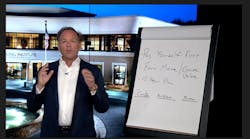QUESTION: Hi Jay. I’ve owned my practice for a number of years now. During that time, I’ve invested a lot of revenue back into the business. But now I’m worried that I’ve waited too long to get my personal finances in order. The good news is I still anticipate practicing for 15 to 20 years before retiring. How would you advise me to balance my practice investments with my personal wealth?
ANSWER: You have probably heard about the importance of “knowing your numbers,” but this is a vague statement that doesn’t give any explanation of how it actually helps you.
The true advantage of having a firm grasp on your finances is that it gives you control and helps you be more intentional with decision-making about money, such as how best to balance business and personal investments. It allows you, rather than outside factors, to dictate your financial picture for both the present and the future.
Imagine a scenario where you meet with your accountant at tax time without feeling any anxiety or fear. Because you’ve stayed on top of your finances on a monthly basis, you already have a clear picture of how much you’ve made rather than not really knowing until you see your return. Instead of spending time with your accountant getting “caught up” with the previous year’s performance, you can be proactive and focus on planning how to continue to build your business and personal wealth in the upcoming year. How great would that feel?
With this knowledge and control, you can be confident in all your decisions regarding your business finances, including revenue, expenses, and personal compensation. It takes all the stressful guesswork out of it. For example, maybe you’re wondering if purchasing that new piece of equipment is what’s needed to bring your practice to the next level. But maybe in reality what’s needed is more investment in yourself as business owner. It’s important to invest in your practice, but not at the expense of investment in yourself. Either way, it’s difficult to make the right decision if you don’t have a strong handle on your current financial picture. It’s like driving on a dark road without headlights.
Ultimately, how can you expect to reach any of your financial goals if you don’t know your current baseline? For instance, you may set a goal for the year to increase business revenue and personal savings. But if you don’t know your starting point, you might go down the wrong path to get there. The danger is you might think it takes being a better dentist or working longer hours when, in most cases, what you really need is to put some processes in place that help you make, spend, and save money more wisely. And please don’t feel that any of this is above your head because you’re not a financial professional. This is about taking the necessary steps to build the business and life you want. It is achievable with some discipline and willingness to learn new habits.
The great news is that there are specific money management action steps you can take to put yourself on the right track. Even better, they can be implemented almost immediately—no matter the stage of your career or state of your finances. I am going to walk you through these steps in a video I recorded for you. I am confident that after watching, you will gain clarity on this oftentimes confusing subject.
JAY GEIER is founder and president of the Scheduling Institute, a premier dental consulting group focused on practice growth, team training, and doctor coaching. Learn more about the Scheduling Institute at schedulinginstitute.com.
About the Author
Jay Geier
Founder, Scheduling Institute
Jay Geier is a world authority on growing independent practices. He is the founder and CEO of Scheduling Institute, a firm that specializes in training and development and coaching doctors on how to transform their private practices into thriving businesses they can keep for a lifetime of revenue or sell for maximum dollar. To hear more, subscribe to Jay’s Private Practice Playbook podcast at podcastfordoctors.com/dentec.
Updated February 15, 2023
